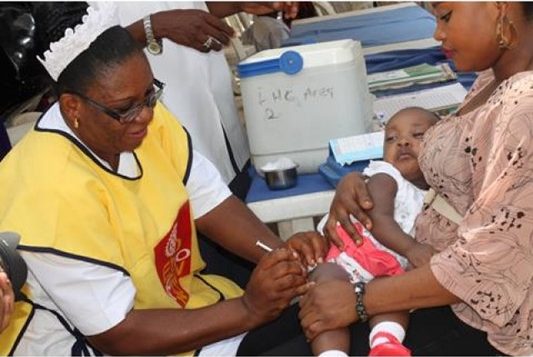
This February, Nigeria became the first polio endemic country to introduce the inactivated polio vaccine (IPV) into its routine immunization system. The Minister of Health, Dr Alhassan Khaliru, described this as “… a quantum-leap opportunity for Nigeria in the polio eradication endgame strategy”.
The introduction of IPV into routine immunization systems is part of one of the four major objectives of the Global Polio Eradication Initiative (GPEI). In May 2012, the World Health Assembly called on all countries which were using only the oral polio vaccine (OPV) to introduce at least one dose of IPV into routine immunization schedules by the end of 2015. This is the largest globally coordinated vaccine introduction project in history.
The launch in Nigeria was supported by the partners of the GPEI, including the Nigerian Government, the World Health Organization, UNICEF, Rotary International, the Centers for Disease Control and Prevention and the Gavi Alliance. Speaking at the launch ceremony, the Minister stated that combining OPV and IPV had threefold benefits: acting as risk mitigation in the global plan to phase out the use of OPVs in 2016, boosting immunity against type 1 and 3 wild poliovirus (WPV) and also tackling the risk of circulating vaccine-derived poliovirus (cVDPV).
While OPV is extremely safe and has led the world to the threshold of being polio-free, on very rare occasions its use can lead to vaccine-associated cases. For this reason, the global eradication of polio requires the cessation of all OPV use, once polio has been eradicated. IPV will then be the only option for countries to maintain immunity levels.
IPV will be introduced in phases. This first phase has introduced IPV in 2 northern endemic States, Bauchi and Jigawa, while the second phase will see the vaccine introduced in the remaining states by 16 March 2015.
Nigeria remains one of the last three countries with endemic WPV transmission, and is also struggling with an outbreak of cVDPV. Significant progress has been made in the past year against WPV, with increased government ownership of the programme and innovative approaches in recent years leading to no cases having been reported for seven months. Yet the World Health Organization Country Representative, Dr Rui Gama Vaz, cautioned against complacency in finishing polio in the country as there are still risks of circulation and re-infection.
Eradicating polio depends on reaching every child with vaccines, whether through campaigns or routine immunization systems. Nigeria introduced IPV in mass polio campaigns in 2014 with more than 3 million doses administered to children 14 weeks to 59 months of age in high risk areas. There are significant positive trends in improving routine immunization coverage with the reported OPV3 coverage of 67% in 2013 compared with 54% in 2010. However, this is still well below the goal of reaching at least 80% of children with reliable routine immunization systems.
While the programme has made significant progress against polio in Nigeria, continuing to strengthen routine immunization and health systems will be crucial to maintain and magnify the gains of recent years.



